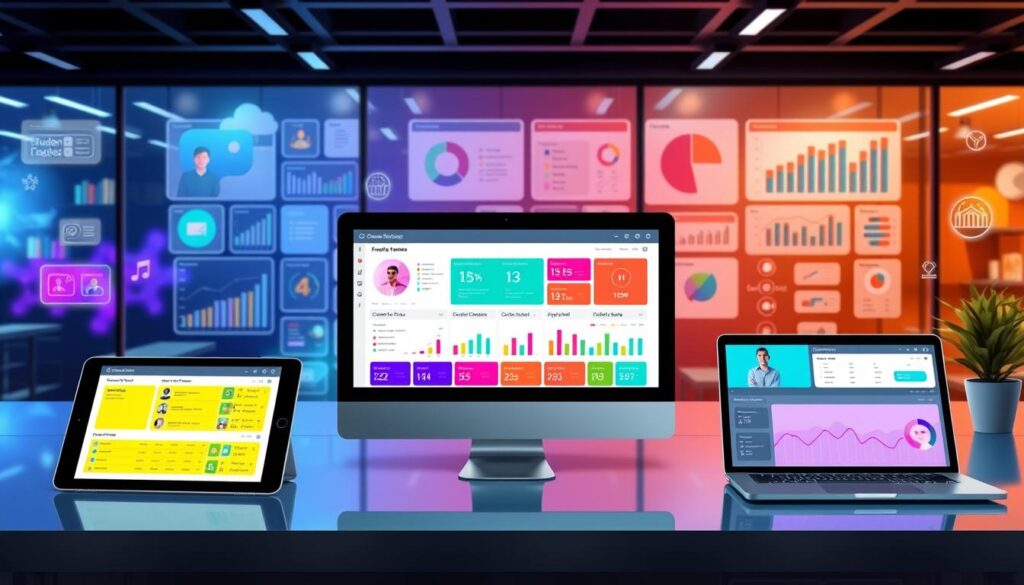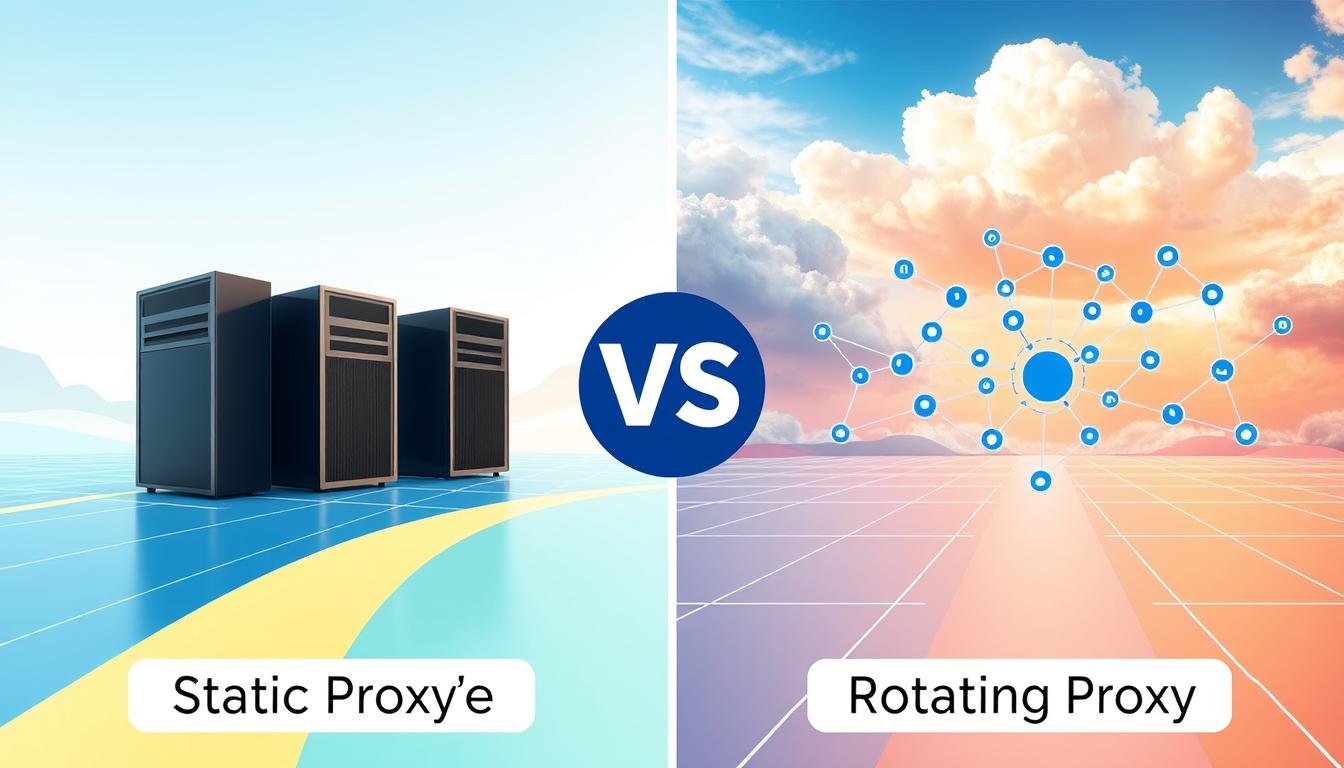FTC disclaimer: This post contains affiliate links and I will be compensated if you make a purchase after clicking on my link.
Are you tired of old systems and slow processes in your school? The right software can change your campus. It makes things run smoother and improves student life. But, with so many choices, finding the right one can be hard.
This guide looks at the 11 best higher education software suites. Each one is made to solve the special problems of schools and colleges. We’ll show you the top digital tools for today’s schools.
Key Takeaways
- Higher education software makes things clearer, more productive, and engaging on campus.
- Top solutions include CRM, LMS, and platforms for admissions, enrollment, and managing students.
- Leading providers like Element451, Slate by Technolutions, and Salesforce Education Cloud offer strong features and customization.
- The right software can make admin tasks easier, improve student life, and help your school succeed.
- Choosing the best fit means looking at how easy it is to use, how well it integrates, and if it can grow with you.
1. Introduction to Higher Education Software
In today’s fast-changing education world, higher education software is key for schools to work better, engage students more, and stay ahead. These tools help with many things like managing student info, campus life, learning, and getting students enrolled.
What is Higher Education Software?
Higher education software is a set of digital tools made for colleges and universities. It helps with school work, learning, and student needs. The goal is to make schools run smoother and better.
Importance of Choosing the Right Software
Finding the right software is very important for schools. It helps them work better, make students happier, and stay competitive. Schools should look for easy-to-use software that fits their needs now and in the future. Good software helps schools run smoothly, engage students, and improve learning.
| Software | Pricing | Key Features |
|---|---|---|
| Maestro SIS | $22,000 per year | Comprehensive student information management, financial aid processing, and enrollment tracking |
| Wisenet | $195 (Starter), $395 (Standard), $595 (Premium) | Flexible pricing options, learning management system integration, and data-driven decision-making |
| Salesforce Education Cloud | $81.25 (Enterprise), $138.75 (Unlimited) per user/month | Robust CRM capabilities, advanced analytics, and collaboration tools for enhanced student engagement |
By looking at different software’s features, prices, and how well they work together, schools can choose wisely. This helps them meet their needs and goals.

2. Top Features to Look For
When picking the best educational tech platforms or academic ERP solutions, focus on key features. A user-friendly interface is key for a smooth experience for students and staff. Integrated learning management systems (LMS) help manage courses, grades, and digital content, making learning better.
Customizability and scalability are also important. Choose software that fits your school’s needs, like managing applications and handling documents. It should also grow with your school, offering strong security and support.
Integrated Learning Management Systems
Top educational tech platforms have integrated learning management systems (LMS). These systems bring together course management, grading, and digital content in one place. They make learning easier for students and teachers, with features like online assignments and real-time feedback.
Customizability and Scalability
Flexible and growing software is vital for schools. Look for Educational Technology Platforms and Academic ERP Solutions that can be tailored to your needs. They should handle admissions, student info, and finances well. Make sure they can grow with your school, offering good support and integration.
| Feature | Importance |
|---|---|
| User-Friendly Interface | Ensures a seamless experience for students and staff |
| Integrated Learning Management Systems | Streamlines course management, grading, and digital content delivery |
| Customizability and Scalability | Accommodates unique institutional needs and growth |

“Investing in the right educational technology platforms and academic ERP solutions can transform the way higher education institutions operate, enhancing the student experience and driving institutional success.”
3. Popular Solutions in the Market
The higher education world has many College Administration Software and University Resource Planning Systems options. You can find everything from Shape and Wisenet to Zoho CRM Education and Salesforce Education Cloud. Each offers something special, helping colleges and universities meet their needs.
Overview of Leading Software Providers
Some top names in higher education software are:
- Shape: It has a full set of features for $119 per user per month. Shape is a top pick for College Administration Software.
- Salesforce Education Cloud: It has advanced dashboards and reporting for $81.25 per user per month. It’s a strong University Resource Planning Systems choice.
- Zoho CRM Education: It offers lots of customization for $57 per user per month. It’s great for schools that want something made just for them.
How They Compare: Strengths and Weaknesses
Each provider has its own strengths and weaknesses. For example, Enrollsy is easy to use, and SchoolMint is known for clear reports. Knowing what each offers is key to picking the right College Administration Software or University Resource Planning Systems for your school.
| Software Provider | Strengths | Weaknesses |
|---|---|---|
| Shape | Comprehensive features, intuitive user experience | Higher price point compared to some competitors |
| Salesforce Education Cloud | Advanced dashboards and reporting, seamless integrations | Steeper learning curve for some users |
| Zoho CRM Education | Extensive customization options, cost-effective pricing | May lack some advanced features found in enterprise-level solutions |
By knowing the strengths and weaknesses of these College Administration Software and University Resource Planning Systems providers, schools can choose wisely. This ensures they find the best fit for their needs and goals.
4. Software for Student Information Management
Student Information Management software is key for better operations and learning in schools. It helps with Student Information Systems and Academic Software Suites. These tools gather data, make processes smoother, and offer insights for better choices.
Key Functionalities
The best Student Information Systems have many features for schools. They include:
- Admissions and enrollment management
- Student record keeping and academic progress tracking
- Tuition and financial aid administration
- Course scheduling and registration
- Comprehensive reporting and data analytics
Benefits for Students and Administration
Using strong Student Information Systems brings many benefits. Schools and students both win:
- Enhanced Student Experience: Students can easily check their records and finances. This helps them be more involved in their learning.
- Streamlined Administrative Processes: For staff, these systems make tasks like admissions and tracking easier. This means better work and more accurate data.
- Informed Decision-Making: With detailed reports and analytics, staff can make smarter choices. This helps with planning and using resources well.
The role of Student Information Systems and Academic Software Suites in schools will only grow. The market is expected to hit $16.7 billion by 2024.

5. Learning Management Systems for Colleges
In higher education, learning management systems (LMS) are key for better online learning. These Educational Technology Platforms are the heart of digital learning. They help colleges and universities offer great courses, team work, and track student progress.
Top LMS Options
Top LMS choices for schools include Moodle, Docebo, and Absorb LMS. These Higher Ed Digital Solutions have many features. They help create courses, test students, and track their progress.
- Moodle: An open-source LMS known for its customizable course-building tools and collaborative learning features.
- Docebo: A cloud-based platform that excels in personalizing learning experiences through AI-powered content recommendations.
- Absorb LMS: A versatile solution that streamlines the delivery, management, and evaluation of eLearning content.
Enhancing Online Learning Experiences
These LMS platforms are key to better online learning for students and teachers. They offer interactive content, real-time talks, and work on phones. This makes learning fun and easy.
They also work well with other Educational Technology Platforms and Higher Ed Digital Solutions. This makes learning smooth across different school activities.
“The right LMS can revolutionize how students learn and how instructors teach in the digital age.” – Dr. Jane Doe, Professor of Educational Technology
As schools change with the times, picking the best LMS is very important. It helps students do well and schools grow.

6. Enrollment Management Solutions
Higher education needs to make admissions easier today. Enrollment management software helps a lot. It makes the whole process from first contact to enrollment smoother.
Streamlining Admissions
These software tools have many features for managing admissions. They handle applications, talk to students, and help make decisions. This makes the process better for students and helps schools work more efficiently.
The Role of Data Analytics
Data analytics is key in these solutions. Schools use it to understand trends and predict success. This helps them improve their recruitment and make better choices.
| Software | Key Features | Benefits |
|---|---|---|
| Element451 | AI-powered personalization, 24/7 support with Bolt AI Assistants | Enhances recruitment and retention through tailored experiences |
| Blackbaud | Integrated admissions, fundraising, and student management | Improves operational efficiency across departments |
| Classe365 | Combines CRM, SIS, and LMS for centralized data management | Provides a comprehensive view of the student lifecycle |
Using the right Best Higher Education Software and Campus Management Software helps schools. They can make admissions easier, improve the student experience, and make better choices with data.
7. Financial Management Software for Institutions
In higher education, good financial management is key. University Resource Planning Systems (URP) and Academic ERP Solutions help a lot. They make budgeting, financial planning, and payments easier. This helps schools stay financially stable and efficient.
Budgeting and Financial Planning Tools
Financial software for schools has great budgeting tools. It lets schools predict costs, plan resources, and track spending well. These systems also do real-time reports, manage grants, and track assets. This keeps financial work accurate and follows rules across departments.
Simplifying Billing and Payments
Academic ERP Solutions work well with school systems. They make billing and getting payments easier. This cuts down on work for staff and makes things better for students.
These systems also have online payment options, payment plans, and reports. They make sure money moves safely and right.
Financial software is very important for schools. It helps keep finances stable, makes work more efficient, and helps make smart choices. With University Resource Planning Systems and Academic ERP Solutions, schools can focus on teaching well. They also make sure their money is handled right.
“Implementing a comprehensive financial management system has been a game-changer for our institution. It has streamlined our budgeting processes, improved financial reporting, and enhanced our ability to make informed decisions.”
– [H3 Heading] Budgeting and Financial Planning Tools
– [H3 Heading] Simplifying Billing and Payments
– Relevant keywords: University Resource Planning Systems, Academic ERP Solutions
8. CRM and Communication Tools for Higher Ed
In the world of College Administration Software and Educational Technology Platforms, CRM and communication tools are key. They help keep strong ties with students, alumni, and others. These tools make outreach personal, interactions smooth, and decisions based on data. This helps in getting more students, keeping them, and making the school better.
Importance of Student Engagement
Keeping students engaged is crucial for schools. CRM and communication tools help make these connections. They track interactions and manage campaigns. This way, schools can give students unique experiences, make them happier, and keep in touch with alumni.
Recommended CRM Solutions
For CRM in higher education, some top names are out there. Salesforce Education Cloud, HubSpot CRM, and Element451 are leaders. They offer tools to make work easier, automate tasks, and work more efficiently.
- Salesforce Education Cloud: It works well with other systems. It helps send personal messages, use social media, and analyze data to attract and keep students.
- HubSpot CRM: It’s easy to use and great for sending emails, managing leads, and tracking progress. It helps manage students from start to finish.
- Element451: It’s made just for schools. It has cool features like dynamic content, predictions, and easy-to-read dashboards. It makes getting students in better.
Using these College Administration Software and Educational Technology Platforms can really help schools. It changes how schools talk to their community. It makes getting and keeping students better, and makes the school stronger.
9. Conclusion: Choosing the Best Higher Education Software
Choosing the right higher education software is important. You need to think about your school’s needs, budget, and goals. Look for software that grows with you, works well with other systems, is easy to use, and has great support.
Final Thoughts on Selection Criteria
When looking at higher education software, find solutions that are flexible. They should work well with your current systems. Choose software that is easy for everyone to use, so it’s adopted quickly.
Future Trends in Higher Education Software
The future of higher education software will change fast. AI and data analytics will play big roles. You’ll see more personalized learning and tools that help make smart decisions.
Mobile learning and teaching in different ways will also grow. This shows how learning is changing and how we need to adapt.








